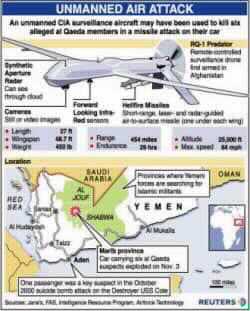HIGHLIGHTS: |||*|Sanaa Offers Safety to Repenting Qaeda Fighters|*|Washington Praises Sanaa's Cooperation|*|Yemeni Investigations Are Continuing|*|Interior Minister Reports to Cabinet in Sanaa|*|U.S. Embassy in Yemen Closed for a Security Review||
______
STORYU.S. Deputy Defense Secretary Paul Wolfowitz said on Tuesday an attack on a car in Yemen at the weekend which killed six suspected al Qaeda members was "a very successful tactical operation."
His remarks came as the Yemeni authorities refused to comment on the cause of the car blast -- apparently a rocket from an unmanned U.S. drone -- and offered safety to repenting al Qaeda militants in the country.
Those killed when their car exploded in the easterly Marib province on Sunday included Qaed Senyan al-Harthi, a suspect in the bombing of the U.S. destroyer Cole in Aden two years ago which killed 17 U.S. sailors.
Wolfowitz told CNN: "One hopes each time you get a success like that, not only to have gotten rid of somebody dangerous, but to have imposed changes in their tactics and operations.
"Sometimes when people are changing, they expose themselves in new ways."
Pressed to provide details, a senior Pentagon official praised the Yemeni government for cooperating with the United States, but refused to say whether Washington might launch similar attacks in the future.
"We have had pretty good cooperation with the government of Yemen and it has certainly improved a lot," he said, adding: "We don't discuss future operations."
White House spokesman Ari Fleischer would not say whether or not President Bush had approved the attack, or give any details of the operation.
Yemeni officials said the blast was under investigation and refused to comment on earlier remarks by a U.S. official in Washington that the car was hit by a missile fired from an unmanned Central Intelligence Agency aircraft.
Yemen said arms, traces of explosives and communications equipment were found in the car.
Interior Minister Rshad al-Alimi gave a report on the blast to the Yemeni cabinet on Tuesday.
Members of the cabinet refused to comment on what had caused the blast, but in a statement urged Yemenis to cooperate with security forces against those responsible for "terrorist activities targeting our country, its people and its national economy," the official Saba news agency reported.
The cabinet said al-Harthi was also wanted for attacks on oil installations in Yemen, a small independent crude producer.
Washington blames the Cole blast on the al Qaeda network of Saudi-born dissident Osama bin Laden, whose ancestral home is Yemen.
SAFETY FOR THOSE WHO REPENT
Yemeni President Ali Abdullah Saleh said in a speech broadcast on state media on Tuesday that he would ensure the safety of al Qaeda members in the country if they "repent and express regret for their sins against the homeland."
In the speech marking the Muslim holy fasting month of Ramadan, he said: "We invite anyone from our people who was a member of al Qaeda...to return to the right path and then their safety will be guaranteed. They will be granted all rights and obligations stipulated by the constitution."
In September Yemen dismissed reports that U.S. forces could launch covert operations in the country against al Qaeda militants believed to have fled Afghanistan.
But U.S. drones are known to have been used to search for fugitive al Qaeda members believed to be protected by armed clans in the country's remote tribal regions.
The search for al Qaeda suspects has presented vast problems for Yemen's overstretched military. In December, Yemeni special forces lost 18 men in a clash with tribesmen during an attempt to arrest al-Harthi.
The Arab state, keen to shake off its image as a haven for Muslim militants, says it has detained 85 people in its hunt for suspected members of al Qaeda and other militant groups.
U.S. military trainers were sent this year to advise Yemeni troops on striking al Qaeda guerrillas reportedly hiding there.
The CIA previously used "Predator" drones to fire missiles at suspected al Qaeda and Taliban fighters in Afghanistan.
The long-range, remote control aircraft is able to loiter over a target for 24 hours, providing still photographs or video footage that can be transmitted within six seconds. It can read traffic signs from 2.8 miles away and has been armed with Hellfire air-to-surface missiles.
The State Department announced the U.S. Embassy in Yemen would be closed to the public on Wednesday for a security review.
"The embassy will reopen at the appropriate time. I am not going to speculate as to when that will be," added the official, who asked not to be named.
Security at the embassy in Sanaa was already tight because of fears that al Qaeda members in Yemen might attack it.
PHOTO CAPTION
Yemen said November 5, 2002 that it was investigating a car blast which killed six alleged al Qaeda members, but refused to comment on reports that the vehicle was destroyed by a missile fired from a U.S. drone. Some of the systems of an armed U.S. Predator drone aircraft as well as details of the Yemen blast are described in this graphic. (Reuters Graphic)
- Author:
& News Agencies - Section:
WORLD HEADLINES


 Home
Home Discover Islam
Discover Islam Quran Recitations
Quran Recitations Lectures
Lectures
 Fatwa
Fatwa Articles
Articles Fiqh
Fiqh E-Books
E-Books Boys & Girls
Boys & Girls  Hajj Rulings
Hajj Rulings Hajj Fatwas
Hajj Fatwas














